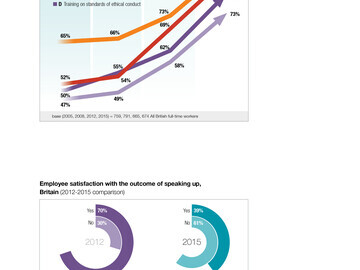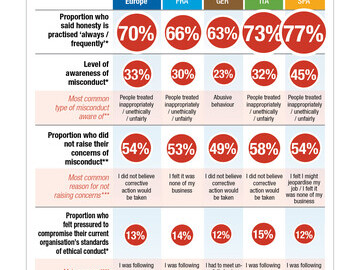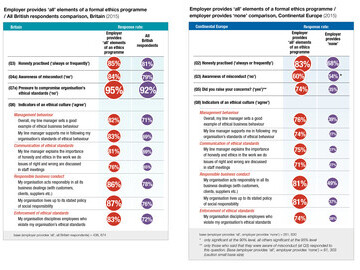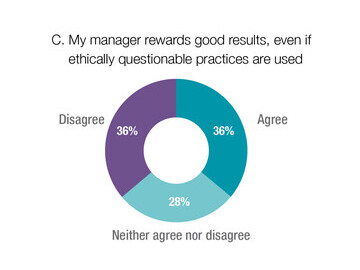Corporate whistleblowing arrangements are not working effectively, IBE survey shows
Roughly half of employees aware of misconduct do not 'speak up' about their concerns, evidence from the IBE Ethics at Work survey shows.
Roughly half of employees aware of misconduct do not 'speak up' about their concerns, evidence from the IBE Ethics at Work survey shows.
“Weak speak up arrangements leave companies vulnerable. If boards do not know what is going on, they cannot protect their businesses against crisis" says Philippa Foster Back, Director of the Institute of Business Ethics (IBE).
11th November 2015: Today the Institute of Business Ethics publishes its Ethics at Work Surveys for Britain, France, Germany, Italy and Spain.
The IBE Ethics at Work Survey has helped to discover what employees think about the way corporate values are applied in their workplace in Britain since 2005. It is clear from the results of the latest survey that corporate ethics programmes have matured, and now appear to be embedded in British organisations.
As employees have become more aware of elements of an ethics programme their expectations of their organisations are higher than before. However, nearly half of employees (45%) are not willing to raise their concerns about misconduct. And of those that did speak up, the proportion who say that they were not satisfied with the outcome has doubled.
Simon Webley, IBE's Research Director said: “61% of those who did speak up say they were dissatisfied with what happened next (compared with 30% in 2012). Why this happens needs addressing if organisations wish employees to have confidence that something will be done if they raise concerns of a potentially serious ethical problem."
Across continental Europe, in general, employees are less positive about their experiences of ethics in the workplace than they were in 2012, when the IBE first extended the survey to include France, Germany, Italy and Spain. Honesty is said to be practised less frequently and employees say that they are more aware of misconduct. Fewer of those aware of misconduct raised their concerns. Furthermore, awareness of each of the four elements of a formal ethics programme is lower.
There are distinct differences between each of the continental European countries surveyed which are explored in the survey reports.
- Germany is the only country surveyed where levels of awareness of ethics programmes did not generally fall – German employees reported a higher level of awareness of codes of ethics and speak up (whistleblowing) lines than in 2012.
- Honesty is said to be practised more frequently in Spanish organisations. Spain is the only country surveyed in which the proportion of employees who said that honesty is practiced 'always or frequently' has increased.
- In France, fear of retaliation is less of a barrier to speaking up. Only 13% of respondents in France said that they did not raise their concerns of misconduct because they felt it might jeopardise their job.
- Italian employees are most aware of speak up lines and ethics training. Awareness levels of a means of reporting misconduct confidentially (35%) or training on ethical standards (39%) are higher in Italy than in the other three continental European countries.
Philippa Foster Back CBE, IBE's Director said: “The insights provided by this research should encourage organisations that 'doing business ethically makes for better business'. Investing in an ethics programme can be seen to have a tangible effect both for engagement and employee behaviour."
Daniel Johnson, author of the report, said: “The IBE's Ethics at Work survey is rich with data about the influence of managers; employee willingness to speak up about misconduct; the pressures on employees to compromise ethical values; and the different experiences of men and women and different generations of the workforce. I hope this data will be of use to companies wishing to engage effectively with their employees on ethical issues."
Other key themes that have emerged from the IBE Ethics at Work Survey are:
Impact of ethics programmes on culture
Employee awareness of corporate ethics programmes increases ethical awareness and perceptions of ethical culture.
The results of the surveys show that in both Britain and continental Europe, awareness of corporate ethics programmes increases the ethical awareness of employees and their perceptions of ethical culture. In both surveys, employees in organisations which provide a code of ethics, a speak up line, advice/information helplines and ethics training, are more likely to say that honesty is practiced always/frequently in their organisation, are less likely to have been aware of misconduct in the preceding year and are more likely to agree with each of the indicators of an ethical culture, than those who do not.
Disconnect between managers and non-managers in awareness
Managers in continental Europe have a greater awareness of support for ethics at work than non-managers.
Corporate messages regarding support for ethics at work appear to struggle to get beyond the management level in continental European organisations. This suggests that the core elements of a corporate ethics programme are not effectively embedded in continental European organisations. Codes of ethics, on the other hand, seem to be an exception and are better embedded with no significant difference in awareness levels between managers and non-managers.
Managers in continental European organisations also seem to have a more positive experience of ethics in the workplace than non-managers, suggesting that there is still work to be done in embedding ethics programmes across all levels of employees.
Say/do gap in Britain
In Britain, while employees are more likely to say that their line manager sets a good example (71%), they are also likely to say that their line manager rewards good results, even if ethically questionable practices are used (36%). This suggests that the gap between what managers say and what they do is growing: it implies that for some good results may take precedence over ethics.
The main findings and themes from the 2015 IBE Ethics at Work Survey are available from the IBE website, together with separate country reports and a comparison of all the continental European data.
ENDS/
For further information, charts, graphics or to organise interviews, please contact Katherine Bradshaw k.bradshaw@ibe.org.uk 07771 517700
Press release distributed by Pressat on behalf of Institute of Business Ethics, on Wednesday 11 November, 2015. For more information subscribe and follow https://pressat.co.uk/
Ethics Business Ethics HR Employees Whistleblowing Business & Finance
You just read:
Corporate whistleblowing arrangements are not working effectively, IBE survey shows
News from this source:






